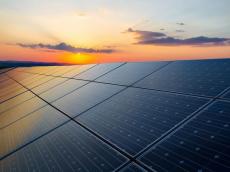|
|
TODAY.AZ / Business
Azerbaijan powering safer future through making strides towards green world
16 July 2024 [12:57] - TODAY.AZ

At a time when new global challenges are emerging, energy transformation has become a central priority on Azerbaijan’s national agenda. Although the country is traditionally rich in hydrocarbon resources, it is now focusing on increasing the share of “green energy” in its electricity production mix. This strategic shift aligns with Azerbaijan’s considerable potential in renewable energy resources, which positions it well to advance a sustainable energy future.
Azerbaijan is demonstrating its role as a reliable energy partner and a responsible actor in the global effort to combat climate change. Through its ambitious plans, the country aims to significantly enhance its renewable energy infrastructure. By the end of 2027, Azerbaijan intends to commission nine new solar and wind power plants, with a combined energy capacity of 2 gigawatts. Furthermore, the nation has outlined a vision for the future, with plans to develop an additional ten wind and solar power plants by 2030, which will collectively add up to 5 gigawatts of new energy capacity.
Solar energy production in Azerbaijan has reached an unprecedented level, with a remarkable ninefold increase in the first half of this year. The total solar energy output surged to 286.6 million kWh, bringing the country’s solar capacity to 32.3 MW.
In the same period, Azerbaijan's total electricity production amounted to 13,557.4 million kWh, with 29.7 million kWh generated from wind power and 286.6 million kWh from solar energy. This impressive growth has nearly doubled the production from green energy sources compared to the 1,081.7 million kWh produced in the same period last year, reaching a new total of 2,032.4 million kWh.
Vugar Bayramov, a member of the Economic Policy, Industry, and Entreprising Committee of the Milli Majlis (Parliament) of Azerbaijan, highlighted these achievements on his social media account.
"Increasing energy production from renewable sources in Azerbaijan as we prepare to host COP29 underscores our commitment to expanding the green energy sector in the region. This significant advancement is not only a contribution to global and regional climate goals but also a step towards strengthening our green economy," Bayramov stated.
He further emphasized that in developed countries, communities and even households generate renewable energy from sources like wind and solar, both for their own use and to sell surplus energy to the government. Adopting a similar model in Azerbaijan could enhance electricity production, lower energy costs for citizens, and introduce innovative approaches to energy generation and distribution. Developing community-based integrated infrastructure will be crucial for this transition.
MP Bayramov also pointed out that Azerbaijan's renewable energy potential is estimated at 27,000 MW, with 23,000 MW from solar and 3,000 MW from wind energy. The vast majority of the country is suitable for solar energy production, while wind energy is most viable in Baku, Absheron, and Khizi regions.
In summary, Azerbaijan is at the forefront of energy transformation amidst emerging global challenges. By diversifying its energy portfolio and significantly expanding its green energy capacity, the country is not only addressing its own energy needs but also positioning itself as a key player in global climate action. The unprecedented growth in solar energy production, alongside ambitious plans for future renewable energy projects, underscores Azerbaijan’s commitment to sustainable development and environmental stewardship. As Azerbaijan prepares to host COP29, these efforts highlight its role as a responsible global partner dedicated to advancing green energy solutions and setting an example for others to follow.
URL: http://www.today.az/news/business/250715.html
 Print version
Print version
Connect with us. Get latest news and updates.
See Also
- 07 April 2025 [13:43]
Czech Ambassador emphasizes practical approaches to sustainable development at Baku Event - 07 April 2025 [13:18]
Ambassador Torma: Azerbaijan plays a key role in Europe's energy security and green transition - 07 April 2025 [12:15]
Feasibility study for Azerbaijan-Turkiye Green Energy Corridor officially launched - 07 April 2025 [11:13]
Baku hosts event on renewable energy and emission reduction - 07 April 2025 [10:53]
Azerbaijan aims to lead Eurasia’s green energy transition and energy connectivity - 05 April 2025 [10:30]
Uzbekistan, Azerbaijan forge strategic tourism partnership - 04 April 2025 [15:27]
Turkiye reaffirms commitment to regional cooperation and green energy - 04 April 2025 [15:17]
Minister Junghietu highlights Moldova’s commitment to Southern Gas Corridor and renewable future - 04 April 2025 [14:41]
Kazakhstan, Uzbekistan, and Azerbaijan launch green energy project to Europe - 04 April 2025 [14:16]
AI integration planned for ASAN Service centers by 2026
Most Popular
 Macron's fears are starting to come true
Macron's fears are starting to come true
 China deeply regrets, rejects Fitch Ratings downgrade
China deeply regrets, rejects Fitch Ratings downgrade
 Uzbekistan, Azerbaijan forge strategic tourism partnership
Uzbekistan, Azerbaijan forge strategic tourism partnership
 N. Korean leader inspects special operation units' training on day of Yoon's ouster
N. Korean leader inspects special operation units' training on day of Yoon's ouster
 Pakistan, US agree to deepen energy ties
Pakistan, US agree to deepen energy ties
 Relocation to Suqovushan village begins: 53 families to move
Relocation to Suqovushan village begins: 53 families to move
 Future supernova of first type find near Solar System for first time
Future supernova of first type find near Solar System for first time
